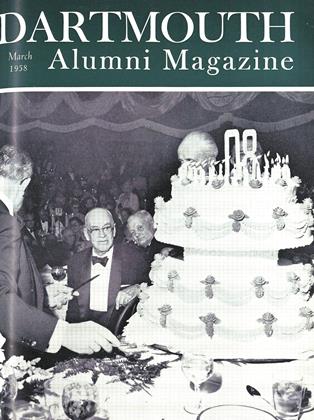NOBODY around Hanover does anything about the weather except possibly the folks up at the Shattuck Observatory. And all they do is to keep a stolid historical record for the U. S. Weather Bureau, as they have been doing since they became a "co-operative station" at the time of its establishment in 1891. Prior to that, their rainfall records date from 1835, and snowfall from 1866. Temperature analyses have been tabulated only as far back as 1875, but that is because the astronomers have been too busy shovelling out their driveways to bother with adding machines.
Although Dartmouth has exploited her winters, we're not sure that the College's claim to frigid monopoly is entirely justified. Compared to Syracuse, Michigan City, and Canaan, N. H., Hanover enjoys a relatively tropical climate - seated in a sheltered inland valley on the esker of a former glacial lake. Also, we are accommodated to the weather, and two feet of snow on Main Street disrupts life infinitely less than two inches on Fifth Avenue. Nevertheless, the all-time record single snowfall of 31 inches over the last weekend slowed us up a bit, and blocked off our end of town (middle-middle-class) from any worldly contact with the newspaper store and the garbage man for an appreciable period.
Not that we don't talk about the weather - since fraternity rushing systems, food at Commons, and noise in the dormitories are, and will remain, small issues till the dog-days of late March. We boast sullenly about the low thermometer readings down by the river, about the similarity of our narrowly plowed streets to World War I trenches, and about ski resorts closing down because of inaccessibleness to their clientele. Further, as Hanover is almost exactly half way up (or down) the State, we automatically accept the worst prediction whenever forecasters differentiate between the "northern portions" and the "southern portions."
This winter seems bad enough, but we have probably been softened by a series of mild seasons. Back in the winter of 1942-43, when the village was jammed with Navy Indoctrination aspirants and their blonde wives - mostly from Texas and Alabama — we had some twenty-one consecutive days on which the temperature - downtown - didn't get above o°, and the southern girls didn't cotton to it. Of course, the official count in the sunshine of Observatory Hill allowed us only nine days between mid-December and mid-February on which the mean reading was sub-zero, and twenty-one days 011 which the minimum plummeted - though it is officially admitted that the —39.5° of February 16 was the lowest recorded in 82 years.
We don't believe those jokers. In the winter of 1933-34, when we were living across the river, they claim that there were as many as fifteen days in the December-March period that failed to score minuses. The coal man and I know better. And they claim that it was a mere —34° on the night of December 30, 1933, but our thermometer (courtesy of the Dartmouth National Bank, a conservative institution) said —50° when we reached port about 0059, with the tree branches creaking and cracking over our heads and the furnace fire gone out.
To the best of our recollection, the placid drone of lectures and recitations has been halted but once for meteorological reasons; and even that occasion, which we welcomed as a bonanza, evoked the scornful comment from an Outing Clubber that the College should be dubbed "Dartmouth: Grandmother of Men." Eleazar Wheelock's concession in delaying the opening hour of daily chapel during the winter months from 5 a.m. till "as early as the President could see to read the Bible" was in no sense a knuckling under to the elements, but rather a sort of Jesuitical compromise with the lighting problem.
We were happy to note, a day or so ago, that the temperature in Caribou, Maine was one degree higher than that in Charleston, South Carolina. Serves them right, magnolias or not, for living there instead of in Caribou.
 View Full Issue
View Full Issue
More From This Issue
-
 Feature
FeatureThe State of Our Purposes ... and Vice Versa
March 1958 -
 Feature
FeatureA Spot of Green at Knob Lake
March 1958 By ALAN COOKE '55 -
 Feature
FeatureA BIG NIGHT AT THE WALDORF
March 1958 -
 Feature
FeatureAlumni Council Has Record Attendance
March 1958 -
 Class Notes
Class Notes1918
March 1958 By ERNEST H. EARLEY, W. CURTIS GLOVER, RICHARD P. WHITE -
 Class Notes
Class Notes1930
March 1958 By RICHARD W. BOWLEN, WALLACE BLAKEY, JOHN F. RICH
BILL McCARTER '19
-
 Article
ArticleNot So Long Ago .... Peerades
November 1933 By Bill McCarter '19 -
 Article
ArticleThe Hanover Scene
April 1953 By BILL McCARTER '19 -
 Article
ArticleThe Hanover Scene
July 1953 By BILL McCARTER '19 -
 Article
ArticleThe Hanover Scene
May 1955 By BILL McCARTER '19 -
 Article
ArticleThe Hanover Scene
November 1957 By BILL McCARTER '19 -
 Article
ArticleThe Hanover Scene
June 1958 By BILL McCARTER '19







